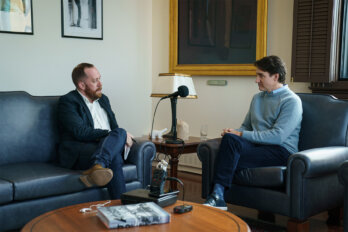There’ll be the breaking of the ancient Western code.
Your private life will suddenly explode.
There’ll be phantoms. There’ll be fires on the road.
And a white man dancing.
—Leonard Cohen, “The Future”
I found myself in the middle of a cozy little riot. The protesters, if that’s the right word, lit a fire and we all gathered round. At the intersection of 13th and K Street, on the day of Donald Trump’s inauguration, scented by the lingering afterhaze of pepper spray, they stood around burning newspaper boxes and garbage cans. The fire was ringed with cameras, a media scrum of the people recording the mild destruction.
The roaring blaze became boring pretty quickly. A woman began throwing the newspapers that littered the street onto the conflagration, and the man standing nearest, who had some vaguely proprietary relationship to the scene, shouted at her to stop: “Don’t feed the fire! Don’t feed the fire!” He grabbed the newspapers out of her hand.
“I want to feed the fire! I’m going to feed the fire!” she shouted, grabbing the newspapers back.
He ripped the newspapers out of her hand and threw them away over the crowd. Force gave him the final word. “Don’t feed the fucking fire.”
But then there was nothing more to burn, and with nothing more to burn there was little left to film. Happily, capitalism came to the rescue. One of the street hustlers of Washington, who sell shreds of political memorabilia to the tourists, arrived waving a bunch of Trump T-shirts in the air. “I got fuel right here.” The shirts were five bucks a pop and he managed to sell several. They didn’t burn as well as newspapers, but they burned.
The crowd would later be classified as anarchists. I have no idea, really, what that means, but political programs were far from anyone’s thoughts as the fire burned. Footage was top of mind. The must-have in riot gear this year is a DSLR camera, the most common model being the Canon Rebel, which was selling this past Black Friday for as little as $399.99. The line between a protester and somebody reporting on the protests had blurred to invisibility. Recording the drama was the primary method of participating in it.
“It’s Casey Neistat! It’s Casey Neistat! Oh my God it’s Casey Neistat!” A slight, trucker-hatted teenager beside me shouted, with that wobbly voice of vulnerability that comes when you encounter real-life people you are used to seeing on screens. It is indeed Casey Neistat, the YouTube star who typically vlogs virally about snowboarding through the deserted streets of New York during a blizzard or traveling on a $21,000, first-class airplane ticket.
Neistat paused in the middle of the supposed anarchy and gracefully took a selfie with the fans. This is America. Even in the throes of a political uprising, there are celebrities and then there’s everybody else.
I stood on top of a smashed limousine, the limousine they would later burn. Ashes the size of oversized Doritos, and acrid smoke, lifted to the clouds. A raggedly bearded guy in his twenties, dressed as if he were used to being arrested, leaned back and howled, “Legalize Palestine!” to no one in particular. He had probably attended the rally that morning on Dupont Circle, at which pot activists had handed out 8,400 free joints. His friends laughed, and he mumbled to himself: “I guess that doesn’t make sense.” His confusion was understandable.
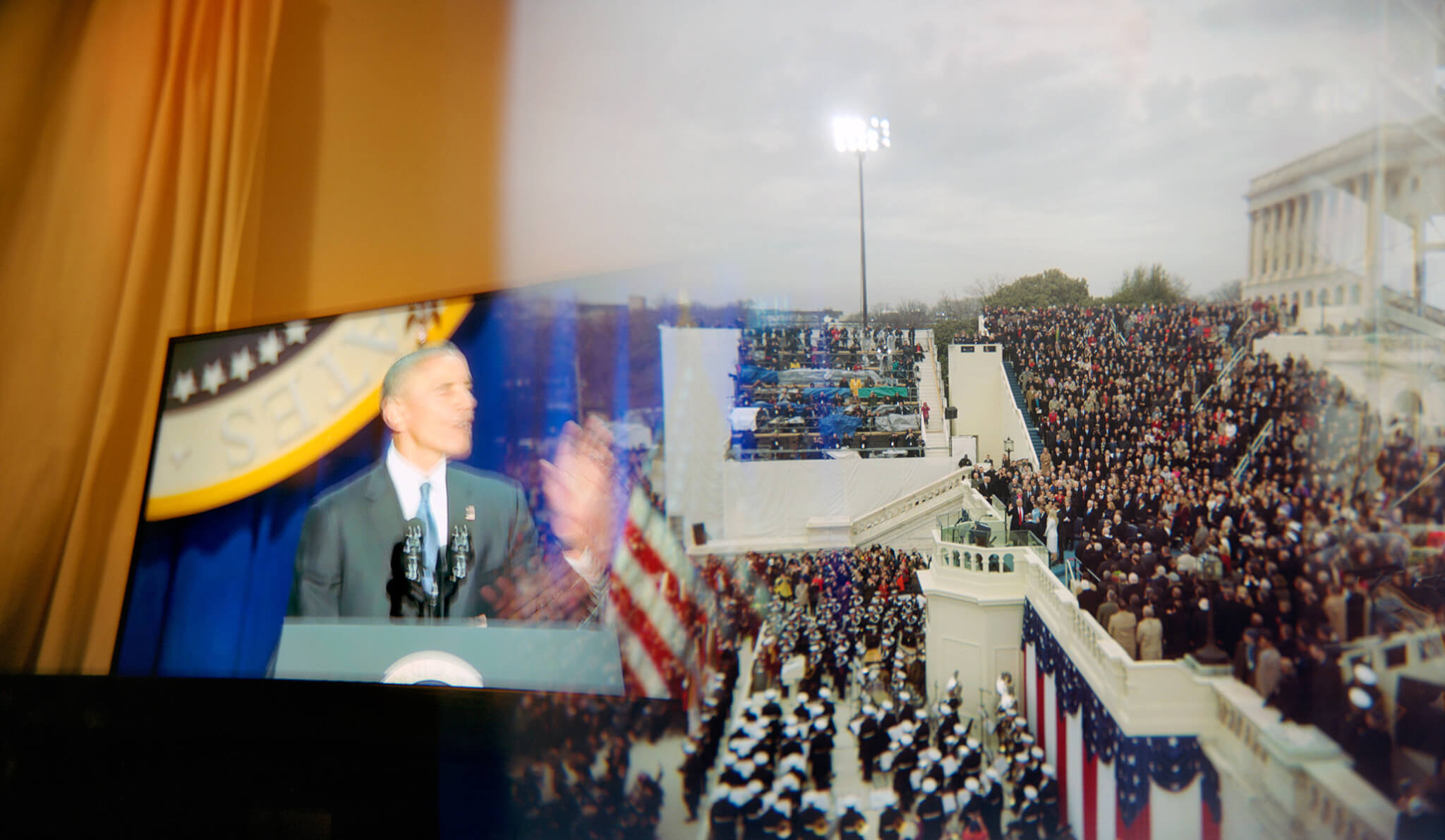
The inauguration of Donald Trump marks the day when the meaning of America collapsed. I belong, loosely, to a group of people who may be called journalists—we go in print, we go on television, and we act like we know what we’re talking about. The inauguration of Donald Trump provided the ultimate proof that we do not. His inauguration was the moment we all have to start over.
The moment itself was also an absurdity. On the one hand, there was the greatest achievement of the Western Enlightenment: the peaceful transition of power in the most powerful country in the world, the sublimation of violence into discourse (burning newspapers notwithstanding). On the other hand, at the centre of this great triumph, there was the spectacle of a man who cannot stop lying taking an oath. It was the ceremonial promise of a man who keeps no promises.
Donald Trump, the man who once compared himself to Alexander the Great in an ad for pizza, whose hair is literally the most elaborate combover in history, a man who accepted the description of his own daughter as a “piece of ass” for the purposes of a radio bit, who has declared that the ethnic bloodline of American judges disqualifies them from service, who may well be compromised by Russian security services, was suddenly president.
I watched the world as I had known it end from the Canadian embassy, which is on Pennsylvania Avenue. The party at the Canadian Embassy is supposed to be the hot party of the inauguration, and I suppose this is true if your definition of hotness encompasses a bunch of naval attachés lining up for BeaverTails and slapping maple leaf mittens in the frigid air. But I was glad to be there. It seemed the right place to watch the new flesh for the old ceremony. Canada’s perspective is unique. Other than Mexicans, we are the people most vulnerable to Trump. If he actually does what he says he’s going to do, we are fucked. It’s all well and good for cynical tech-overlord and Trump supporter Peter Thiel to say that we are supposed to take Trump seriously but not literally. Tell that to the people watching the inauguration at the Canadian Embassy, who have to make decisions based on what they think the President of the United States is going to do. Almost $600 billion worth of annual trade is bound up in the answer. I pity the people in power in our country right now: The best thing would be for the President to forget we exist. But how are we supposed not to speak up when he stands against everything we stand for?
Looking out over the more-or-less deserted parade route along which the pirate king was to process, any thinking person concerned with public policy would sense that the darkness of the scene was only a symptom. America is not the only one to fall. The ultranationalist parties of Europe—Front National in France, Viktor Orbán in Hungary, the Five Star Movement in Italy, and Jarosław Kaczyński in Poland—are no longer marginal. Hungary banned the practice of Islam in May, and used tear gas and fire hoses on refugees at the border in September. London, the great international city, has been rocked by a rise in hate crime following Brexit. Loathing for others is now a worldwide phenomenon.
It was not supposed to be this way. The era of globalization was supposed to bring the people of the world closer to one another. Openness of trade was supposed to elicit its spiritual equivalent: cosmopolitanism, the recognition of a common humanity within our vast difference. “Some day all barriers will fall,” The French economist Frederic Passy predicted in the 1840s. “Some day mankind, constantly united by continuous transactions, will form just one workshop, one market, and one family.” We may be approaching the world becoming one workshop and one market, but we are farther from ever from the world becoming one family.
As recently as 2006, a new cosmopolitan order seemed inevitable. In his book Cosmopolitanism: Ethics in a World of Strangers, Kwame Anthony Appiah could write: “It is hard to resist the evidence that, starting with our common biology and the shared problems of the human situation (and granted that we may also share cultural traits because of our common origins), human societies have ended up having many deep things in common.” Tell that to the crowd at the Trump inauguration.
The threat to cosmopolitanism is coming from both the right and the left. While the neonationalist right is reshaping global politics along the lines of racial and ethnic categories, the left has been consumed, almost entirely, by questions of cultural identity, problematizing cross-cultural exchange. Reading the books, playing the music, wearing the clothes, even eating the food of the other have become fraught gestures, burdened by the weight of collective guilt. All encounters across cultures now stand suspect of privilege and appropriation. Those who believe with the great African Roman writer Terence Afer that “I am human, and nothing that is human is alien to me,” are pressed on from both sides. The cosmopolitan ideal is dying a lonely death. The world is returning to its stupid tribes.
And the tribes hate truth. The fact—a quantum of information outside of opinion, a statement about the world we had all agreed to stop arguing about—has dissolved under the force of hyperpartisanship and social media. Technology and narcissism created an epistemology of tribes. A thing now is a fact if enough people like it.
The death of the fact is far worse than the death of cosmopolitanism, because it is so much harder to see how this loss can be recovered. Distortion swallows the evidence of itself. The term “fake news,” which for a brief few weeks had signified the deliberate spread of misinformation, and which had resulted in forty percent of Trump’s supporters in Florida believing that Hillary Clinton was “an actual demon,” was co-opted almost instantly by hyperpartisans. Rush Limbaugh called the liberal media “fake news,” and Donald Trump called CNN “fake news” and then the term was meaningless. There was our fake news and your fake news so there was no fake news and it was all fake news. The ground from which to see the ground falling out from under us was falling out from under us.
Everybody, at least, could see the inauguration. There were a few prayers. There was the jockeying of insiders on a stage, kissing one another, an oath on a couple of Bibles. Then there was the speech, which was both shocking in its rage and folly, and totally unsurprising. It did contain a line which I believe will stand alongside “Let the word go forth” and “The only thing we have to fear is fear itself.” The President of the United States, with the greatest military the world has ever known behind him, unemployment at 4.6 percent, and the Dow at almost 20,000, declared: “This American carnage stops right here and stops right now.”
What does it mean? Nobody knows what it means. What does it signal? To whom? What are the policies? Nobody knows. The professional diplomatic class watched the President say “It’s going to be only America first, America first” and they all took a sharp intake of breath. They couldn’t even guess what that meant. Many of the people they used to talk to in the various departments of the American government had picked up their things and left. The elites of other countries were trying to plan, but they were planning like gamblers now, planning like people who’ve been given odds by their doctors about cancer survival rates, trying to estimate outcomes.
One thing was certain: Paying attention to what Donald Trump said in a speech wasn’t going to clarify anything. So we ate our chowder and sipped our Crown Royal with cider and looked at each other and did not know what to say. For Canada’s 150th birthday, the United States has provided a massive reminder that we are utterly dependent on an occasionally insane neighbour.
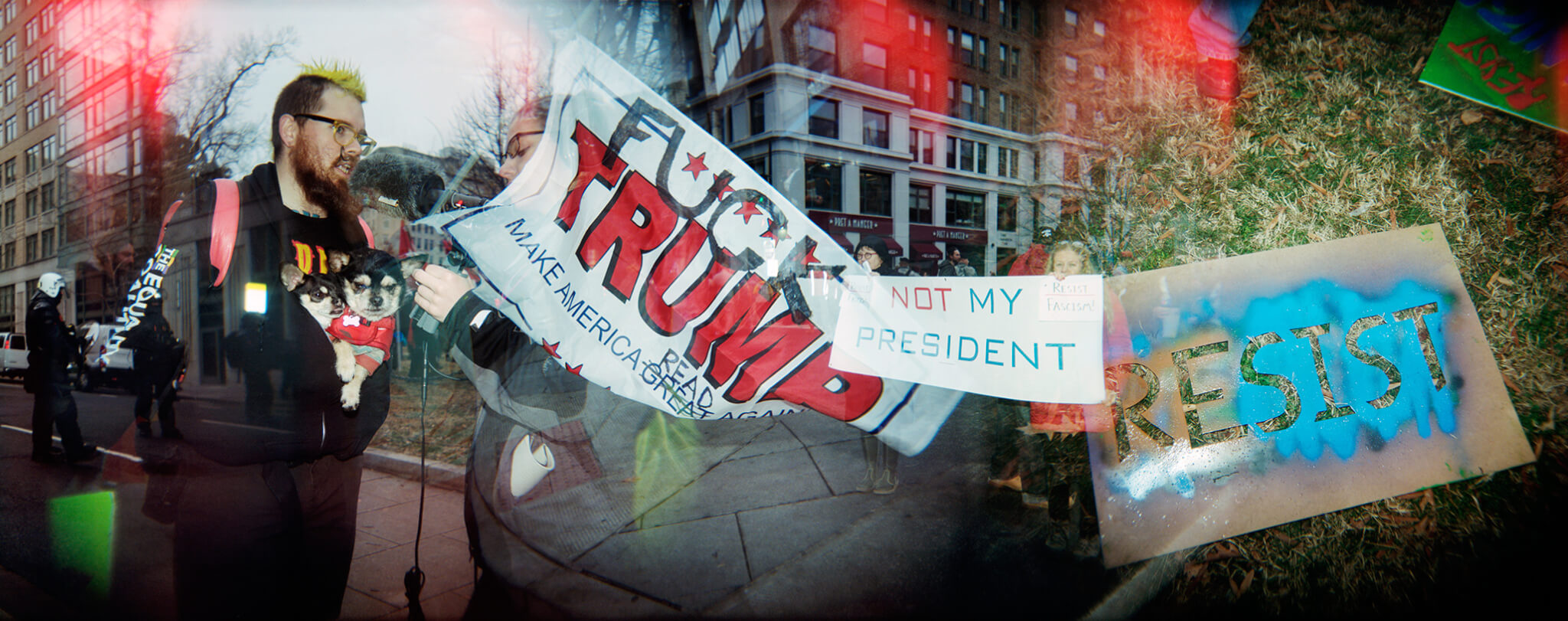
The real action was behind the Canadian Embassy anyway—one of the main entry points onto the Washington Mall, and one of the nearer points to the stage for people without inauguration tickets. A loose collection of activists had made a human chain to block access. There were physical fights with Trump supporters, pushing and shoving and hitting, because young men are unbearable when they think they’re doing something important. But again it was mostly your-camera-against-mine. Activists from the “alt-right” showed up with HD cameras to record their confrontations with Black Lives Matter, who were recording their confrontations. Your virality against mine.
The blocking activists sang all the usual angry chants: “What do we do? Shut shit down,” and “This Checkpoint is closed.” The “alt-right” asked them why they were such losers. And then Alex Jones, legendary InfoWars ranter, passed by. This has been his time. Conspiracy theorists were hot in 2016 and looked to get hotter in 2017. Jones, of course, was much too important to stand and fight, but he took the time to stop and scream at the protesters, “Scum.” Moving on, he caught the eye of a young black man wearing a “Make America Great Again” hat—grounds for taking a selfie with him. “You’re a brave man,” he said.
I stayed behind to talk to this brave man. Anson Paul is twenty-seven years old, a registered Republican, and a personal trainer to many politicians, including prominent Democrats. I asked him if he has ever disagreed with anything Jones has said. He laughed, and replied, “George Soros.”
It was a good choice of a conspiracy to disown. Jones has claimed at various points that George Soros is planning to overthrow America and to install himself as its shadow president, and that Soros had aided the Nazis in stealing from Jews. Paul is a fan, but he understood this to be a distortion. “His delivery, we all know, is for dramatic effect. What I like is that he calls attention to the other side.”
Paul also knows that Jones makes some things up. “It’s up to me, the curious reader, to do my own research. I take it for what it is, entertainment.”
We were standing beside a crowd brimming with physical violence and held back by police. Some entertainment. I asked Paul if he didn’t think journalism should be held to any standard of veracity if it isn’t dangerous to spread ideas you know aren’t true. He shrugged. “These are adults. You don’t tell a film what political views to hold.”
Pew Research recently reported that 16 percent of Americans admitted to sharing a story they later realized was fake, but 14 percent of Americans had shared fake news knowing it was fake. Of all the losses that the inauguration signifies, the most essential is this: The authority of fact has died in the hearts of ordinary people. This failure is not merely institutional. The love of seeing and speaking clearly has been overwhelmed by the furies of rage and pride.
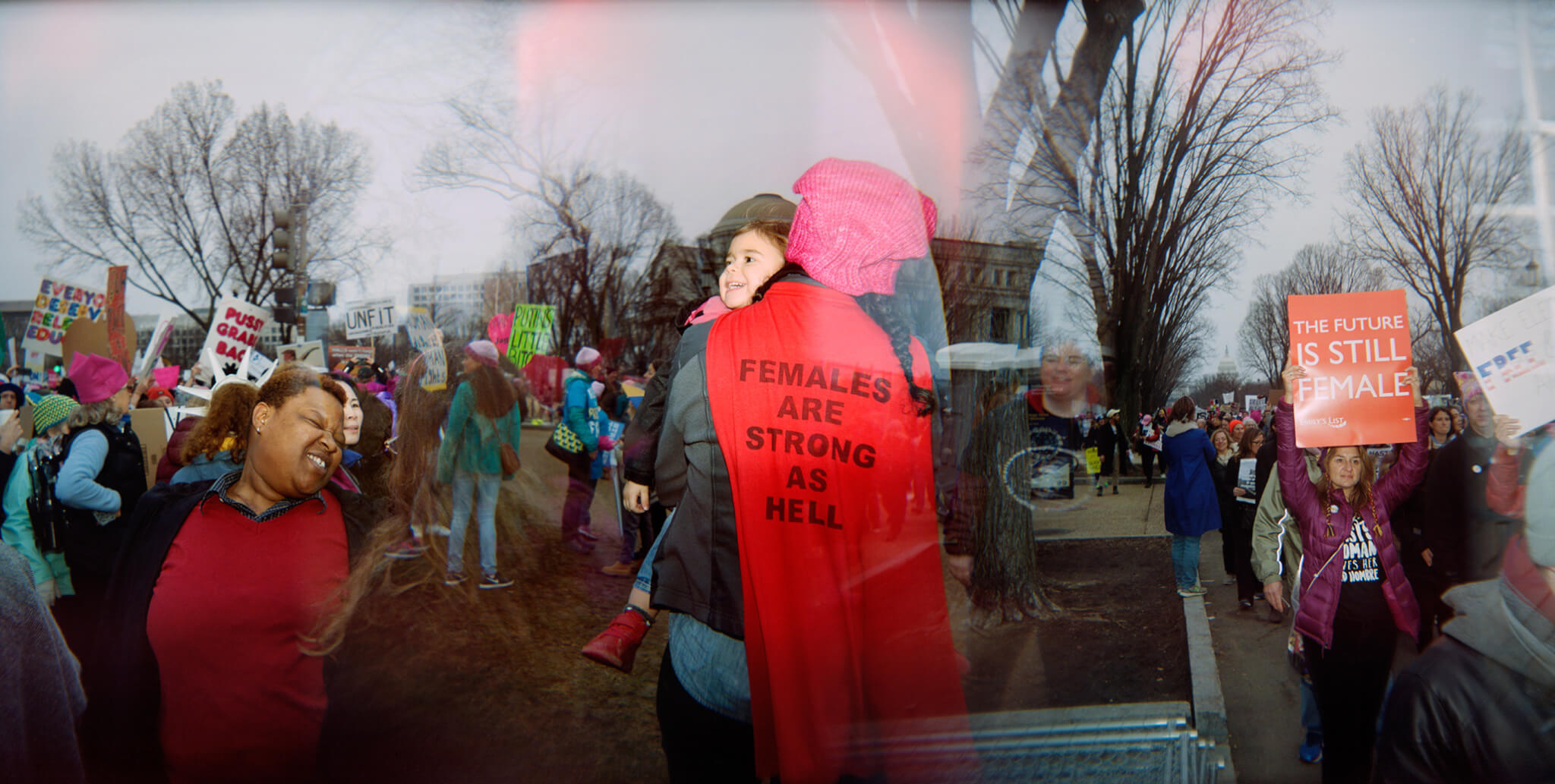
There’s a story I’ve reread since Trump was elected. It’s an old one, published in The Atlantic in December 1863, right in the teeth of the Civil War. “The Man without a Country,” by Everett Hale, was a classic in its time, taught in high schools all over America—it produced that semi-religious devotion that high school literature sometimes elicits (To Kill A Mockingbird, The Catcher in the Rye). During the bicentennial, there was even a gravestone set up in front of the Covington County Courthouse in Andalusia, Alabama, dedicated to the memory of the fictional character at the heart of the story.
“The Man Without a Country” was written during a time when America was unsure if it were a country and about another time when America was unsure if it was a country. Aaron Burr, vice-president under Thomas Jefferson and the man who killed Alexander Hamilton (yes, the guy from the musical) in a duel, was charged with treason in 1807. It was alleged that he planned to establish a separate country in the Southwest. Burr was eventually acquitted. But Philip Nolan, the fictional co-conspirator with Burr in “The Man Without a Country” was not. At his trial, in a fit of rage, he shouts out “Damn the United States! I wish I may never hear of the United States again.” His punishment is the fulfillment of his wish: “Prisoner, hear the sentence of the Court. The Court decides, subject to the approval of the President, that you never hear the name of the United States again.” They even take away his naval buttons, which bear the inscription “US.”
Not only are Nolan’s fellow sailors forbidden from mentioning their home country; they have to cut any reference to it out of Burr’s books. “Right in the midst of one of Napoleon’s battles, or one of Canning’s speeches, poor Nolan would find a great hole, because on the back of the page of that paper there had been an advertisement of a pack for New York, or a scrap from the President’s message.”
He craves facts about American politics above all. Sex is as nothing to his desire to know. At one point in the story, because the other sailors need his stateroom, he’s invited to a ball on the ship. Nolan meets a woman he knew from home and tries to squeeze some information out of her:
“And what do you hear from home, Mrs. Graff?”
And that splendid creature looked through him. Jove! how she must have looked through him!
“Home!! Mr. Nolan!!! I thought you were the man who never wanted to hear of home again!”—and she walked directly up the deck to her husband, and left poor Nolan alone, as he always was.—He did not dance again.
Meanwhile the country keeps changing and Nolan has no idea. He belongs to what he doesn’t understand. And he loves what he no longer belongs to.
His craft, on its endless sea journey, encounters a slave ship. (The Atlantic was founded as an anti-slavery periodical; it has endorsed three presidential candidates—Abraham Lincoln, Lyndon Johnson, and Hillary Clinton.) The captain of Nolan’s vessel thinks only of returning the slaves back to their homelands. Nolan finds this unbearable, and he gives a speech to one of the boys on board:
Remember, boy, that behind all these men you have to do with, behind officers, and government, and people even, there is the Country Herself, your Country, and that you belong to Her as you belong to your own mother. Stand by Her, boy, as you would stand by your mother, if those devils there had got hold of her to-day!
“The Man Without a Country” is in one sense a very simple story, one that you could happily read to boys that you’re about to send off to war, a strange but palatable fable of patriotism. But there is also a very profound, very dark paradox knotted in its centre: Like the Trump voter who longs for an America that doesn’t exist, every patriot hates his or her country. When you love your country, that’s when it drives you crazy. You can only love your country when you imagine what it is rather than see what it is. You can only love home from the boat.
Here’s the immediate result of the inauguration of Donald Trump: The hype-addled patriots who felt that their country was being taken away from them have their country back. But already you can feel the question hovering in the air: Did they really want it back?
I attended one of the smaller Deploraballs, the parties the “alt-right” threw for themselves to celebrate Trump’s victory. I couldn’t get into the main one, where there was fighting in the streets outside, and the police had to use themselves as barricades to protect the guest. The one I attended was like a shitty small-town high school reunion. The theme was Cuban music and ethnic food—oxtail stew, churros, fried rice in the Central American style. For some reason, oversized robots, like those you might see in a Midwestern mall promoting a one-day sale on big screen TVs, paraded near the entrance. The guests posed with a large basket, because they were in the “basket of deplorables.” (Get it?) The tuxes looked rented.
The problem was that the jokes no longer made any sense. They weren’t the alternative anymore. It’s fun to parody people when you’re an outsider. But they were insiders. And besides, when the band played “Besame Mucho,” as a joke, everybody danced like it wasn’t a joke. Because “Besame Mucho” is a great song. Oxtail tastes good, for real. Churros taste good, for real.
I saw one of these revelers, stumbling drunkenly out of the Deploraball in a kitschy sombrero. He looked like he had no idea where to go.
Mercifully, Stan’s was close by. I cannot say for certain that Stan’s is the best bar in the world. I don’t know if it’s even the best bar in Washington, which has a hell of a lot of great bars. But it serves alcohol with the heaviest pour I’ve ever known and it seems to produce, alchemically, happiness. Once, long ago, I spent an afternoon in Stan’s with my wife and after two gin and tonics we decided that we were going to call everyone that we loved—our parents, our friends, distant relations. It’s the kind of place that allows you do things like that.
In Stan’s, on the eve of the inauguration of Donald Trump, the clientele, mostly African-American professionals, were not miserable. They were not wandering around lost, like the man in the sombrero at the Deploraball. They were laughing and shouting out jokes: “I want to move to Ukraine!”
Another patron said to me, on hearing that I’m a writer: “I would like to speak to middle America. I have two words: Fuck you.” But it’s the kind of fuck you that you would extend to the fans of an opposing football team.
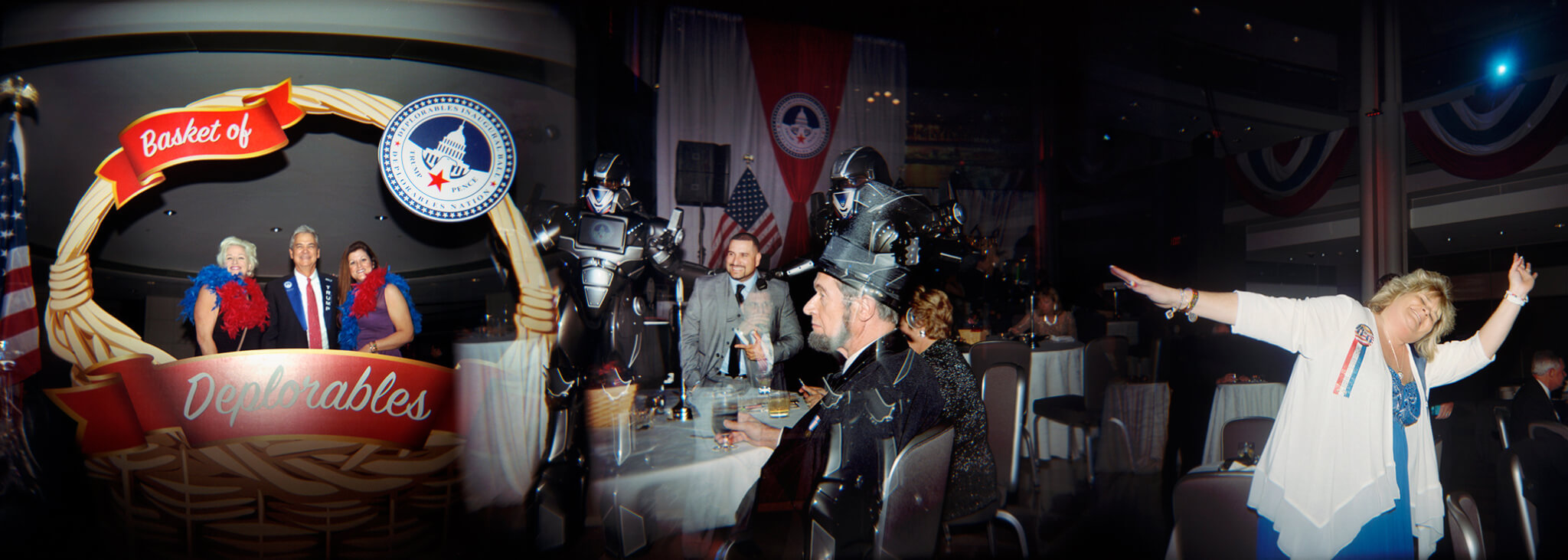
The next day, lying in bed, I could already feel the change in the air. By the time I arrived at the subway to join the groups of people heading to the Women’s March, it was obvious. Change is coming. It has to.
I have never seen so many women. There were men, too, but they were defined by their relationships to women: They were husbands and fathers and brothers and uncles and sons. The march was a display of the power of women. White women. Black women. Asian women. Latina women. There were women with five hundred dollar highlights who had jetted in from Manhattan, and there were community college students from the suburbs, who had shown up in dirty sweatpants. There were radical socialists and there were hockey players from Minnesota. There were queer Afghan moms, and there were young Black Lives Matter teenagers, and there were Christian grandmothers. There were Jews and Muslims. There were the good, hearty Canadian women who had dressed appropriately for the weather. The official crowd size estimate was 500,000—a city of women. It was a city of women flowing through a city of power and it was beautiful. Born in the late ’70s, I have never understood the appeal of political marches, but I understood this. It was the opposite of the Internet and its inherent division and loathing and facelessness. Before the march, the usual splintering politics of online communities had threatened to stop the march before it had started. None of it mattered on the day. All it took was to see each other’s faces.
Sharona Sankar-King had come to the march with her mother from New York. She was not angry or hateful. “There’s a lot of well-meaning people who voted for Trump. And he duped them. He used them.”
Most of the Americans I know are white and bicoastal, I told her, and they are angry in a way I have never seen them, angry in a way that seems to threaten the premise of the country itself. Because it’s one thing for the people of Kentucky to despise the elites of New York and California and Washington. It’s quite another thing for California and New York and Washington to despise the people of Kansas and Kentucky.
She explained the situation to me as you would to a child. “You don’t yell at the patient to get well. You find them medicine.”
But they voted for Trump. They voted for “Hillary is a demon” and the Muslim registry.
She started to lose patience with me. “I’m glad Mr. White Guy is scared. We’ve been through worse. My grandma lived through Jim Crow. My mom used to get shot at for going to school.” Then she paused, and a smile passed over her face. “I’m a senior executive at an ad agency. Are you kidding me? I have no complaints. I hope that when my daughter and son think about my life, they think, ‘That was so much scarier then.’”
The moving city of women had none of the despair of the previous day’s various occupations. The marching women held funny signs and they sang and they hugged each other. The most common slogan I heard them shouting was, “This is what democracy looks like.” It is a protest classic, but it struck me: The March on Washington is not, in fact, what democracy looks like. Democracy looks like Donald Trump in office.
Several decent and reasonable friends and neighbours have expressed this reservation to me. What’s the point of marching? A hundred thousand marched against the Nazis in Berlin in 1932. Protest marches are for the signalling of virtue; a resort for losers. But I’m not sure we have all understood the situation as it stands. The point is not to achieve political effects, not yet. The point is to escape the isolation and fragmentation of contemporary politics, to see people’s faces, to share the same view for a while. Amid the onslaught of distortion, cynicism is more than a cosmetic danger. Like Russia’s Putin, like Turkey’s Erdogan, America’s Trump thrives on people believing that distortion doesn’t matter. Cynicism has to be resisted. It is the first point of resistance.
At the end of “The Man Without a Country,” Philip Nolan is lying in bed; his room has become a shrine to the country he cursed.
The stars and stripes were triced up above and around a picture of Washington, and he had painted a majestic eagle, with lightnings blazing from his beak and his foot just clasping the whole globe, which his wings overshadowed. The dear old boy saw my glance, and said, with a sad smile, ‘Here, you see, I have a country!’ And then he pointed to the foot of his bed, where I had not seen before a great map of the United States, as he had drawn it from memory, and which he had there to look upon as he lay. Quaint, queer old names were on it, in large letters: ‘Indiana Territory,’ ‘Mississippi Territory,’ and ‘Louisiana Territory,’ as I suppose our fathers learned such things.
As he lies dying, a friend named Danforth finally tells him all that has happened to America—of the states that have joined the union, the triumphs of the young country. But he can’t bring himself to talk about the Civil War, which was underway during the story’s composition. Even in the end, even by a compassionate friend, Nolan has to be deceived about the nature of his country. Again, more hidden darkness: The patriotism the story celebrates is a bunch of empty symbols in a miserable room on a boat. And then his last wish! “Bury me in the sea; it has been my home, and I love it.” The fate of Philip Nolan, the man without a country, is homelessness, rootlessness, pure cosmopolitanism.
I do not believe that the world can simply concede the cosmopolitan ideal. Pride in your tribe may sometimes be necessary but it is always a blunt, unthinking force. For one thing, without cosmopolitanism, there is no “Besame Mucho” in London or Toronto or Washington. The human connection that is achieved through the sharing of differences is the only source of insight into who we might be as human beings. Whether we like it or not, no matter how uncomfortable it may be, globalization is bringing human unity to the fore. “The challenge is to take mind and hearts formed over long millennia of living in local troops and equip them with ideas and institutions that will allow us to live together as the global tribe we have become,” Appiah wrote in Cosmopolitanism. He was presumptuous, obviously. A decade later, the very existence of a global tribe is at hazard. Clearly, at the moment, we hate our differences more than we love our bonds. Nonetheless, the old wisdom is true in the new world. We must love one another or die.
On my way home from DC, on my way back to my own country, as I watched Kellyann Conway describe the existence of “alternative facts” on a TV in an airport bar, I remembered a conversation I’d had with a colleague who was planning a long-overdue vacation. The son of Rwandan immigrants, he was thinking about where in the world he could go. I suggested, right off, Italy. Nobody has a bad vacation in Italy, right? I mean, Rome. Yeah, but there were conflicts with African migrants nearly every day. Okay, well, then, London. Post-Brexit? Forget it. Paris? He thought Paris might be fine, if they thought he was North American, but he had an African name . . .
An all-inclusive resort in the Caribbean? He’d done something similar before, and had been confused with a waiter. I believe in cosmopolitanism. I believe it is the only hope. But where was cosmopolitanism for my friend?
I have always believed that the most beautiful quality of American life is the way Americans talk to each other. You notice it the moment you arrive from a foreign country. The agents behind the airline counters gossip more freely. The cabbie and his fare argue directions more openly. They don’t whisper, the way people do in Cuba. They don’t talk placidly and exchange endless nothings like Canadians either. The frankness of American speech is felt more often than recognized, as much a part of the background as the smell of stale tobacco or running engines. Americans themselves don’t notice the way that they talk because they have this habit of assuming everyone is like they are. It’s why so many foreigners, myself included, feel jumbled, both liberated and lost in space, on arrival in the US. Frankness is obvious in the most everyday interactions but it is political too, the essence of being a citizen rather than a subject. The First Amendment comes first after all. The most American statement of all is to be able to say what you mean.
What if Americans have stopped being able to speak with each other? Trump promised to make America whiter, maler, straighter. It will not be. Two weeks after his election, Uber’s Self-Driving truck service delivered 50,000 cans of Budweiser from Fort Collins to Colorado Springs. There are 3.5 million truck drivers in the United States. Truck driving is the most common form of employment in twenty-nine states, one of the last blue-collar jobs that pays a middle class wage. These male-dominated working-class jobs are not going to be shipped to China or Mexico. Their jobs are about to be cached on a server.
Trump is the same figure in power that he was on the campaign trail. He represents distortion, and the realization of dominance through distortion. Trump ran not against a political platform but against history. Four years from now, the Make America Great Again crowd is going to wake up in a country where the demographics are the same, except their insurance costs more. Who will Trump blame then? Because the lies vaulted him to power, he has to keep lying. Distortion leads to more distortion.
The most obvious act of resistance to Trumpism is to see and to speak clearly. Simply going to the inauguration to bear witness to the crowds and the attendant protest is a political act. Trump has rendered it such. Writing itself, the attempt to make sense, is now a political act. Science, the attempt to describe the world, is now a political act. Whether we want it or not, anyone who observes and reports is now an agent. Fact-checking and peer review are no longer abstruse aspects of professional castes; they are sacred obligations. To check a fact is to preserve a white dove in the heart of the temple.
Articulation itself has become revolutionary. Speechwriters for George W. Bush and radical feminists currently have more in common with one another than either group does with the president. The despair is new and the hope will be new, too. I do not know whether the forces of articulation are more powerful than the forces of distortion, but for those whose politics is the politics of the fact there is no retreat. We have that going for us.


